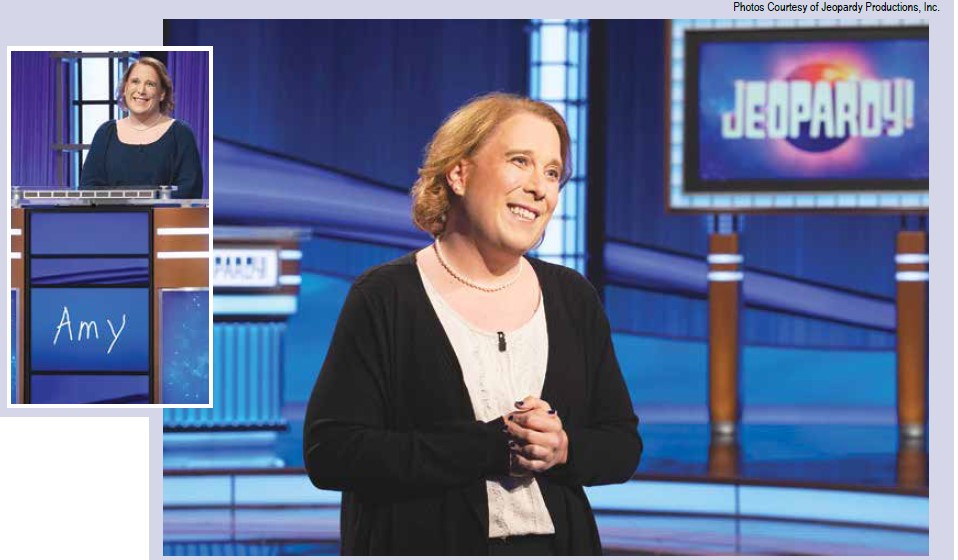
By Joanie Juster–
Way back in December 16 I wrote: “Amy Schneider is on a roll, and shows no signs of slowing down. Her string of powerhouse victories on Jeopardy! is making history.”
At that time, Amy had won 13 games, and more than $536,000.
Thirteen games? That was so 2021. By the time Amy’s historic winning streak ended on January 26, she had won a mindboggling 40 games—the second highest number in Jeopardy! history—and earned over $1.3 million. She won twice as many games as the second-most successful woman on Jeopardy! , and is the first trans contestant to qualify for the Tournament of Champions.
How did she do it?
The answer starts with some FAQs about the popular game show that was originally created by media mogul Merv Griffin (1925–2007). Jeopardy! airs each weeknight at 7 pm and the show’s production team tapes a week’s worth of programs in a day, twice a week. Most contestants only get to play in one game, while winners play more games until they are bested. Amy won 40 games, which meant flying down to Los Angeles multiple times for those intense 5-game days, all while holding down a demanding full-time job as an engineering manager.

All of Amy’s games—her entire historic winning streak—were therefore in the can before even one of them aired. This meant she had to keep the secret of her huge achievement under her hat for almost two months until the rest of the world caught up. Only those closest to her—her mother and brother, her girlfriend Genevieve Davis, her managers at work (since she had to take time off)—knew that she had made history.
Amy provided me for the San Francisco Bay Times, with insights into her time as a Jeopardy! champion, and how it has changed her life.
Competing on Jeopardy! had been a lifelong dream for Amy, whose love of reading and breadth of knowledge led her 8th grade classmates to dub her “Most Likely to Be on Jeopardy!” But it’s one thing to dream about it while watching at home, and quite another to appear on camera for a nationwide audience, again and again and again, for 40 games.
She admitted to me that she felt stressed before the first taping. She was worried that COVID precautions would prevent the crew from providing hair and makeup assistance, so she had a local friend fly down to help her. Jeopardy! asks contestants to bring three outfits—just in case they are lucky enough to win more than one game. “I am an overpacker,” Amy said, so she was prepared with multiple costume changes when she won all five games that first day. (See her Instagram account, @JeopardAmy, where she documented the outfits she wore onscreen.)
With a background in theater, Amy was used to being onstage, but playing a fast-paced game like Jeopardy! on camera for a national audience is a whole different type of pressure. And although she wasn’t the first trans contestant to appear on the show, she knew that simply by being a trans woman on one of the most iconic family-friendly, middle-America shows in the country, she had the potential to change how trans people are viewed.
She wisely chose to simply be herself, and tried to share her whole self: her creative side, her sense of humor, her love of learning, and anecdotes that made clear that she is a multifaceted human being with much to offer.
“I think what people have seen on Jeopardy! is I’ve tried to be as authentic as possible,” she told me for the Bay Times.
That authenticity has won over hearts and minds throughout the country. Her fans, who range from small children to grandparents in their 90s, follow her devotedly on Twitter (126.5k followers and counting), where she would post a blow-by-blow analysis after each game aired, providing fascinating insight into how the game is played, and details of her own strengths and vulnerabilities.

She consistently praises her fellow contestants with genuine grace and warmth, and had nothing but kind words for her opponent, Rhone Talsma, who ended her 40-game winning streak by besting her in Final Jeopardy. She tweeted, “Ngl, it was crushing. I know I’d been thinking my streak would end, but that doesn’t mean I wanted it to! But I had to put my best face on, and make sure that I didn’t pull any focus from Rhone, it was a great, well-deserved moment for him and he deserved to enjoy it to the full!”
To the delight of her followers, Amy has been refreshingly open and down-to-earth on social media about her personal life, posting candid details about her tattoos, her girlfriend, her signature pearl necklace, and, of course, her cat Meep. She also happily answers questions about everything from her game strategy to her favorite movies.
But social media can bring out the haters, also, and on New Year’s Eve, Amy used her quick wit to shut them down en masse with one brilliant tweet: “I’d like to thank all the people who have taken the time, during this busy holiday season, to reach out and explain to me that, actually, I’m a man. Every single one of you is the first person ever to make that very clever point, which had never once before crossed my mind.”
Amy knows from personal experience that representation matters. “I didn’t know the word transgender when I was growing up in Ohio,” she said. And when she did eventually see depictions of trans people on television, the portrayals tended to be negative. When she moved to California in 2009 and finally met real trans people living their authentic daily lives, she started imagining other possibilities for herself.
Successful trans performers like Laverne Cox, and especially Natasha Muse, were eye-opening. Amy said, “Natasha was really smart, really funny, had a wife and kids—she had a life!”
Playing the role of Francis Flute in A Midsummer Night’s Dream in San Jose in 2012 brought these ideas into focus. During the play-within-a-play, Flute is forced to dress as a woman. Wearing the dress and makeup caused a lightbulb moment for Amy. She started exploring options, and finally transitioned in 2017.
With the media blitz that has followed her Jeopardy! success, Amy has found herself on a very public stage, being interviewed by The New York Times, Washington Post, NPR, CNN, and every other major media outlet. On the day that I spoke with her, she was juggling interviews with some of these media giants.
“I get recognized a lot these days,” she said.
Winning $1,382,800 may sound like a lot of money, but in these times, it is enough to enhance your life, but not enough to retire. Fortunately, Amy loves her day job; she got into computer programming because she finds it very creative. She explained, “Writing software, you start with a blank screen, then start writing. It’s translating between human and machine.”
Reading the notes from her devoted fans on social media, it becomes clear that Amy not only has made an impact as a successful trans woman, but she has also made being smart cool again. Amy doesn’t just enjoy trivia; her love of books and learning is profound, and when asked about the disturbing trend of school districts and libraries banning books about LGBTQ+ issues and characters, she stated, “I owe so much of the joy I’ve found in the world to books, and what’s great about them, the whole point of reading, is to learn new things. If you’re not learning anything new, why are you reading?”

She added, “You don’t have to agree with everything you read, but when you see something you disagree with, it’s a great opportunity to explore why you disagree, and, at times, come to change your mind. A library that doesn’t challenge you is a library robbed of most of its value and purpose.”
What’s next for Amy? She loves Oakland, and with her new winnings, she hopes to buy a house, and spend the rest of her life there. She is captivated by the beauty of the Bay Area: the hills, the cinematic quality of the light, the ever-changing scenery, and the diversity and vibrancy of the culture.
She is now contemplating her next steps, including how to use her new platform for good. She has been nominated for a Special Recognition award from GLAAD, acknowledging her positive representation in the media, and other nonprofits have reached out to her to discuss potential ways she can use her voice to help others. The overwhelmingly positive feedback she has received from viewers has made her aware of her positive influence as a role model, particularly, as she says, for all the “nerdy trans girls” out there who finally see someone like them on the television screen.
“As far as my platform,” she said, “I’m still figuring out how to use it. I feel some responsibility to use it to advocate for issues I believe in. It’s definitely something I’m considering as I enter this new phase of my public life.”
The significance of her achievement is still sinking in, as she is still sorting out the impact on her life of both her winnings and her newfound celebrity. The Jeopardy! Tournament of Champions lies ahead later this year with the possibilities of more earnings, and new opportunities are coming her way each day. But in a recent Instagram post, Amy, whose gifts go far beyond her preternatural ability to come up with obscure facts on a moment’s notice, made clear that she understands what she had really won:
“I think the main thing that I got out of this was being OK with myself, how I look, how I present to the world. I’ve been openly trans for a little under five years now, and there’s still definitely lingering worry and dysphoria and things like that. Just to get so much positive feedback, so much support, and so much acceptance, it enabled me—by the end of it—to look at myself on TV and be like, ‘Oh, you know, she’s pretty, she’s fun, what a likeable person.’ And I’ve never been able to see myself that way before.”
Joanie Juster is a long-time community volunteer, activist, and ally.
Published on February 10, 2022
Recent Comments